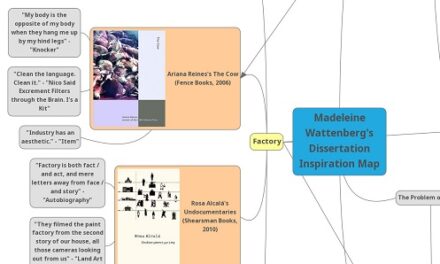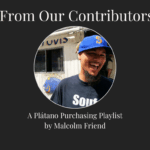Assistant Editor Connor Yeck: With the start of a new year, I often like to make a few writing resolutions. These will change in wording and scope from year to year, but the goals usually remain the same. Write more. Write differently. Write in new places and at new times. Write by hand, even. And of course: read, read, read.
In this moment of all-around burnout though, it can feel harder than ever to create work we’re proud of and at the pace we’d like. So, only a few weeks into 2022, I find myself returning to the tried-and-true world of writing prompts to kickstart the year, and I got to thinking how useful, freeing, and downright enjoyable they can be for some quick inspiration.
I’ll never forget my first semester here at the University of Cincinnati when, in a poetic forms class taught by John Drury, we asked him to dream up a “needlessly complex prompt” for our next meeting. We’d been reading and writing sonnets, sestinas, ghazals, and odes, and though technically it wasn’t a workshop, we’d grown to love seeing the ways everyone tackled the variety of formal constraints.
John, of course, didn’t disappoint. We still pass around the email containing his prompt (ending with a much-needed “Good luck!) today. It asked us to write a poem with a particular pattern of stanzas, line lengths, and rhymes; to be addressed to a particular person, living or dead, famous or infamous; to include a quote from a newspaper, the name of at least one tree or flower, the name of a small town, or a question that might trouble or embarrass; and a title that should be long, descriptive, and with an image not included in the poem itself.
I think about this prompt whenever I feel myself falling into a writing slump. What’s more, I end up thinking of the experience of sharing the poems the prompt produced. It was a bit like show-and-tell, and “workshop” took on a totally new meaning.
Each poem was a cobbled-together, clockwork creation. We could see where someone adhered to the given rules or bent them as far as they could go. And it was so easy to show each other what we’d created, all the possible apprehension of workshop replaced by the knowledge we’d set off with the very same goal in mind and had ended up in such spectacularly different places.
While some might find even the broadest writing prompts to be a bit prescriptive or formulaic, to me, they channel the same generative energy that any creative form does, whether it be a sonnet or a piece of microfiction. You’ve got a place to start, a mission at hand, and an easy exit—all lifesavers if you feel yourself adrift.
So, where to look? In a sea of websites, blogs, books, and online writing groups, there’s never a shortage of places to find inspiration, and prompts for any mindset, timeframe, or mood. Here are some all-time greats that myself and fellow editors at CR find especially useful:
- Poetry Foundation Library, “Poetry & Practice”: A perfect fit for “National Poetry Month and beyond,” this resource is a running catalog of prompts, minilessons, exercises, and linked readings. Bite-sized and with distinct age ranges, the page has a fantastic body of material to choose from. Some selected themes: “Language of Flowers,” “The Story of My Name,” “Night Creatures,” “Drum Dreaming,” and “Poetry Map Making.”
- “The Time Is Now”: Poets & Writers offers this curated selection of prompts (now in its eleventh year) around which to build your writing week—poetry on Tuesdays, fiction on Wednesdays, and literary nonfiction on Thursdays. I love the specificity and brevity of these prompts—for example, calling for five minutes of writing, a single scene between characters, or list-making. A great balance of both work-generating ideas and supporting materials.
- When asked about go-to prompts, Associate Editor Lisa Low pointed me toward The Poet’s Companion: A Guide to the Pleasures of Writing Poetry by Kim Addonizio and Dorianne Laux, with its mixture of craft essays and exercises (sections include “Writing the Erotic,” “Poetry of Place,” “Voice and Style,” and “Writer’s Block”). Likewise, Practice of Poetry Writing: Exercises from Poets Who Teach by Robin Behn and Chase Twichell, which is composed entirely of writing exercises. For everyday writing, Managing Editor Lisa Ampleman also suggests The Daily Poet by Kelli Russell Agodon and Martha Silano.
- On the fiction side of things, Assistant Editor Lily Meyer mentioned resources such as Jami Attenberg’s “#1000wordsofsummer” as a popular, prompt-like undertaking—a yearly community-driven marathon to write a thousand words a day for two weeks straight.
- For another sort of community-styled prompt, Rattle offers two long-standing opportunities: their “Ekphrastic Challenge,” in which poets have a month to respond to a chosen image, and “Poets Respond,” which solicits poems written about a public event in the previous week, to be published each Sunday.
And last but not least, if you’re looking for something a bit more fluid than specific topics, tasks, exercises, or constraints, I’ve always had a soft spot for “idea generators”—a chance to spin the wheel and receive randomly generated words, textures, facts, and so much more.
- The website of author Robert Peake has an excellent tool to request a specific number of words and challenges to be combined into a single prompt (after my first spin, it looks like I’ll need to include the word “dreadful” and the names “Donne” and “Rilke,” and then mention several children’s games and a recent news story).
- The “Writer Igniter” at DIY MFA offers a similar system but is a bit more focused on scene. Each click provides a character, a situation, a prop, and a setting, and it feels perfect for flash fiction, screenwriting, or even drama.
- Then there’s Mental Floss’s “Amazing Fact Generator,” a simple, endlessly entertaining source of strange, striking, and writable facts to frame any piece of creative writing (did anyone guess that sharks are older than trees?).
If you’re in the need of inspiration, structure, or just a bit of creative direction, I hope you’ll find something in these resources to start your 2022 off right. Short and sweet, or long and complicated, there’s a prompt out there for every occasion and every writer.









